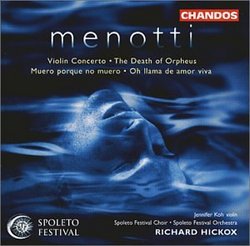| All Artists: Gian Carlo Menotti, Richard Hickox, Jennifer Koh, Spoleto Festival Orchestra Title: Menotti: Violin Concerto, The Death of Orpheus Members Wishing: 0 Total Copies: 0 Label: Chandos Original Release Date: 1/1/2001 Re-Release Date: 2/26/2002 Album Type: Live Genre: Classical Styles: Opera & Classical Vocal, Forms & Genres, Concertos, Historical Periods, Modern, 20th, & 21st Century, Instruments, Strings, Symphonies Number of Discs: 1 SwapaCD Credits: 1 UPC: 095115997925 |
Search - Gian Carlo Menotti, Richard Hickox, Jennifer Koh :: Menotti: Violin Concerto, The Death of Orpheus
 | Gian Carlo Menotti, Richard Hickox, Jennifer Koh Menotti: Violin Concerto, The Death of Orpheus Genre: Classical
|
Larger Image |
CD Details |
CD ReviewsA fine performance by Koh. John B Wolff | Ann Arbor, Michigan, USA | 08/27/2002 (5 out of 5 stars) "Jennifer Koh has not received the top of the heap reviews of the concerto. She should. I could be critical but the other recording of any merit is on Reference Recordings. Unfortunately it is in AZ and I am in MI and can't make a side by side comparison. But she is head and shoulders above the competition and the orchestra is ever, ever, so much better. A real relief for one who loves this concerto. It should be played more in the concert hall. If you haven't heard the this lyrical, romantic, twentieth century concerto, then better rush to buy this. The sound is extra fine; full and warm. I don't think the violin she is using is all that great but the sound is OK and enjoyable. Some old fiddles are finally giving out and this might be one of them but is seems to give her a responsive fiddle that lets her do whatever she pleases. Koh has technique galore. I do wish she would use more artistic fingerings but I am probably the only one who is going to carp about their scarcity. The Death is a good coupling as most listeners will not be familer with either work. Buy this!" No Mean Menotti! Thomas F. Bertonneau | Oswego, NY United States | 06/29/2002 (4 out of 5 stars) "I voted positively for the previous Gian-Carlo Menotti disc from Chandos, the one featuring "L'apocalisse" and the suite from "Sebastian" and filled out by the "Fantasia," really a one-movement concerto, for cello and orchestra. The big item on the new disc in what is apparently a Menotti cycle from Chandos is the Violin Concerto (1952) in three movements; the rest of the program consists of three of Menotti's vocal-choral cantatas, two on Spanish- and one on an English-language text. Menotti enjoys his reputation because of his operas. Conductor Richard Hickox and the Spoleto Festival players have decided to present Menotti's instrumental and non-operatic vocal music in new recordings; Menotti has produced not a little in both categories. There are, for example, two concertos for piano, one for double bass, not to mention the Cello Fantasia. The Violin Concerto shows some audacity on its composer's part in this sense: Menotti spent many decades as the partner of Samuel Barber, who wrote "the" American violin concerto in 1939; any fiddle score by Menotti would inevitably invite comparison with Barber, probably of a negative sort under the claim of derivation. In fact, Menotti's concerto is its own creature entirely and is in some respects superior to Barber's oft-performed showpiece. The First Movement (Allegro Moderato) begins with lyric urgency, the solo spinning out a long melodic (and rather modal sounding) line over subtle, non-intrusive orchestral accompaniment; the orchestral part occasionally comes into its own. This is a more complicated movement psychologically than the corresponding movement of the Barber concerto. At moments, one feels how intuitively close Menotti is to the mid-century Italian instrumental composers such as Malipiero and Pizetti. Like them, Menotti grafts romantic harmony on baroque forms; the business of the Malipiero orchestra, for example, is close at hand in Menotti's Concerto -- the moto perpetuo bustle distantly reminiscent of Vivaldi or Corelli. The Second Movement (Adagio) is an aria for the solo and orchestra, of great warmth. The Third Movement (Allegro Vivace) has a scherzo-like quality. Jennifer Koh is the violinist. Since I know no other performance of the work, I can only say that she sounds convincing to me, if not as robust in her execution of the part as she might be. The three cantatas, if not terribly significant, are at least enjoyable. "The Death of Orpheus" is a kind of operatic scena for voices and orchestra. Recommended for the marvelous Concerto."
|

 Track Listings (6) - Disc #1
Track Listings (6) - Disc #1